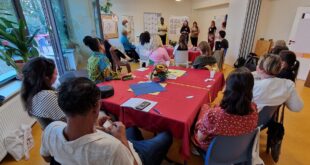Last year, Nigeria was one of the main countries of origin of asylum-seekers in Germany. Against this background, the Konrad-Adenauer-Stiftung invited German and Nigerian officials to a technical roundtable discussion in Berlin on Thursday. Among others, the experts discussed how to make rejected Nigerian asylum-seekers leave Germany voluntarily and explore possible solutions to irregular migration from their country. Femi Awoniyi, Editor-in-Chief of The African Courier, was at the event and he reports.
The Konrad-Adenauer-Stiftung (Konrad-Adenauer-Foundation or KAS) on Thursday (14 November) hosted a powerful delegation from Nigeria to a round of discussions on migration in Berlin. KAS is a political party foundation associated with but independent of the governing Christian Democratic Union (CDU).
The event, entitled “Shared Responsibility: Discussing migration within the context of Nigeria and Germany” and which took place at the office of the Foundation in the German capital, explored how both countries could collaborate better to tackle the challenges posed by irregular migration of Nigerians to Germany.
Kicking the parley off, Christian Bilfinger, Policy Advisor on Refugee and Migration Policy at KAS, said there were 72,000 Nigerians currently registered as living in Germany. About 12,000 of these have been issued papers to leave the country because their asylum claims had been rejected.
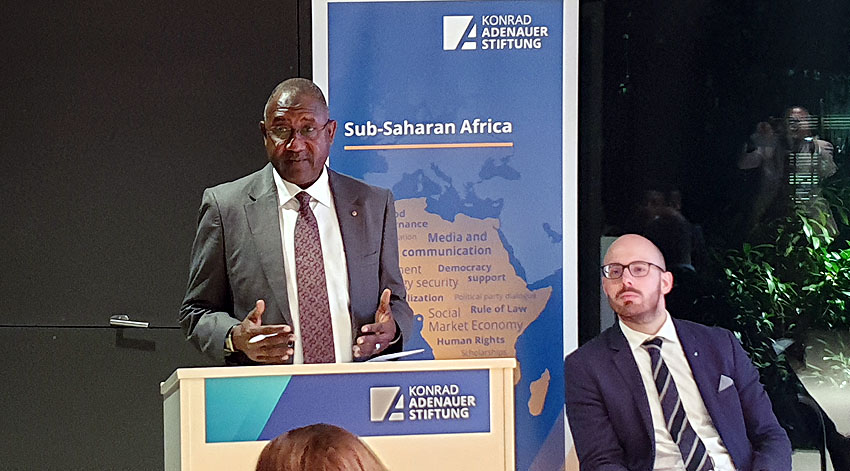
Another 20,000 were still expecting a final determination of their applications for protection under the country’s asylum laws. In view of the low recognition rates of Nigerian asylum claimants, about 6.5 per cent, it’s obvious that most of them would have to leave the country too, Bilfinger added.
Hence, about 30,000 Nigerians have no prospects of legally staying on in the country, he said.
Moreover, Nigeria was among the top five countries of origin of asylum-seekers in Germany last year*, indicating that the tendency for more Nigerians coming to the country to claim asylum is rising, the migration expert added.
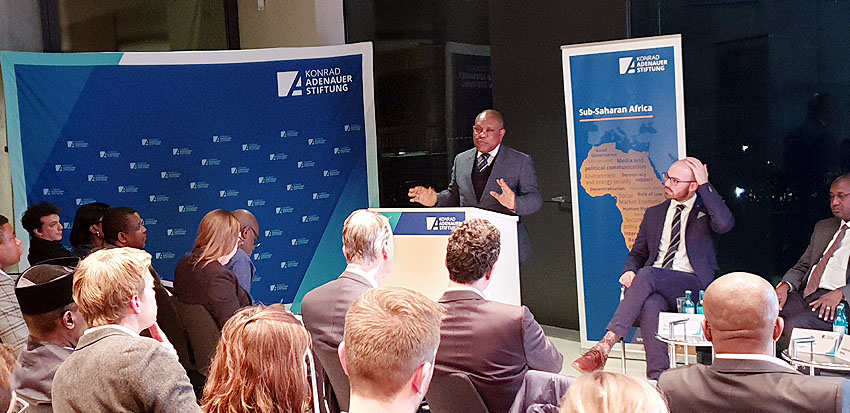
How to make these Nigerians without right to remain in Germany return home in an orderly manner and reduce the number of those coming to Germany to claim asylum were the motivation for convening the meeting.
Challenges of sending back Nigerians
In his speech, the head of KAS office in Nigeria, Dr Vladimir Kreck, said the issue of irregular migration is linked to the situation of the country. More than 90 million Nigerians live in extreme poverty while the country is beset by security challenges – Boko Haram in the North East and violence linked with Fulani herdsmen in Central Nigeria and other parts of the country, for example.
Moreover, Nigeria was growing demographically at a rate that, according to the UN, would make the country, with a projected population of 450 million, the world’s third most populous nation, after India and China, by 2050.
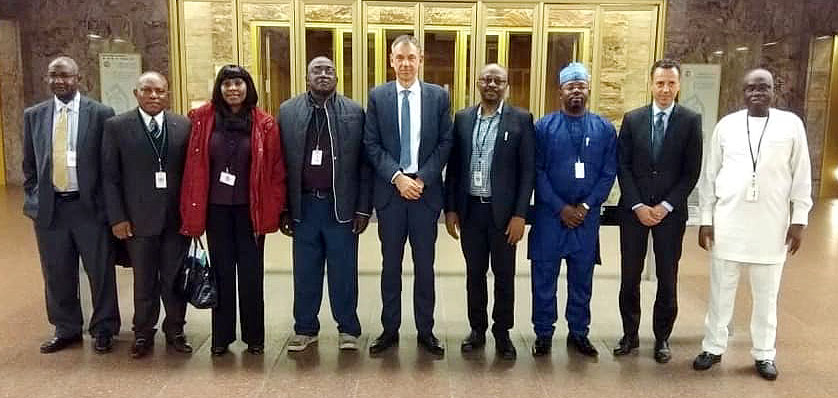
In view of these facts, “is it a solution to send the rejected asylum-seekers back to Nigeria?” Mr Kreck asked. “They will only go back to the very problems that drove them out of the country in the first place,” he added. “If they have the opportunity they will leave the country again.”
Kreck therefore suggested that a lasting solution would be for Nigeria to be assisted towards sustainable economic development.
It’s pointless for Nigerians to seek asylum in Germany
Stephan Meyer, the Parliamentary Secretary at Germany’s Federal Ministry of the Interior, in his speech, said it’s better for Nigerians wishing to come to Germany to do so legally in view of the low recognition rate of asylum claims of people from Nigeria. He explained that Germany was interested in intensifying ties with Nigeria and Berlin currently focuses on economic engagement and the repatriation of Nigerians who don’t have legal papers to live in Germany.
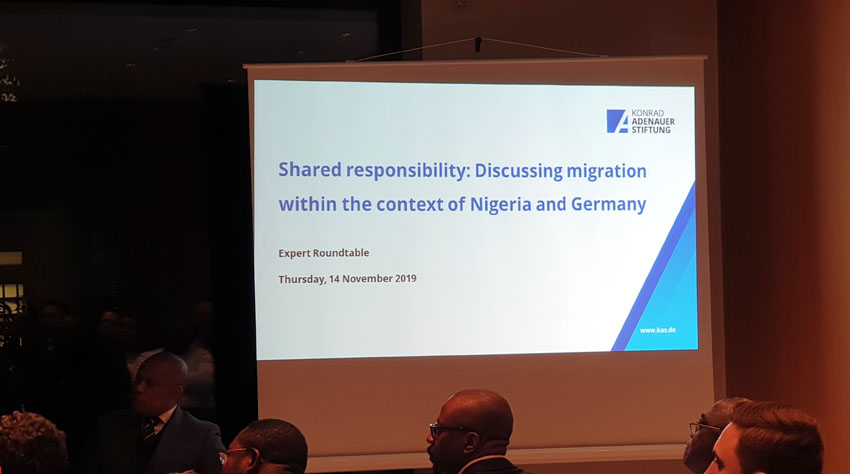
Meyer said several German delegations had visited Nigeria in recent times to dialogue with Abuja on the issue. And that the aim of Berlin was for both countries to co-operate on migration management.
The high-ranking interior ministry official said Germany’s new labour migration law, which enters into effect early next year, provides an opportunity for Nigerians wishing to settle in the country to come here legally. “Please tell your people that it’s pointless to come to Germany to apply for asylum. There’s now a possibility to come here and work legally,” he appealed to the Nigerian delegation.
Criminal industry drives irregular migration
Responding, Hon. Muhammad Sani Zorro, influential politician and member of the delegation from Abuja, said most Nigerian irregular migrants in Europe were not from the areas challenged by security issues. He blamed a criminal industry for driving irregular migration in the country.
READ ALSO Again! 40 Nigerians deported by Germany; activist calls for policy change
Zorro, who represented a constituency of Jigawa State in the Federal House of Representatives on the platform of the ruling All Progressives Congress between 2015-2019, said Nigeria recognised the sovereign right of Germany to protect its interests including determining the kind of people it allows into its territory.
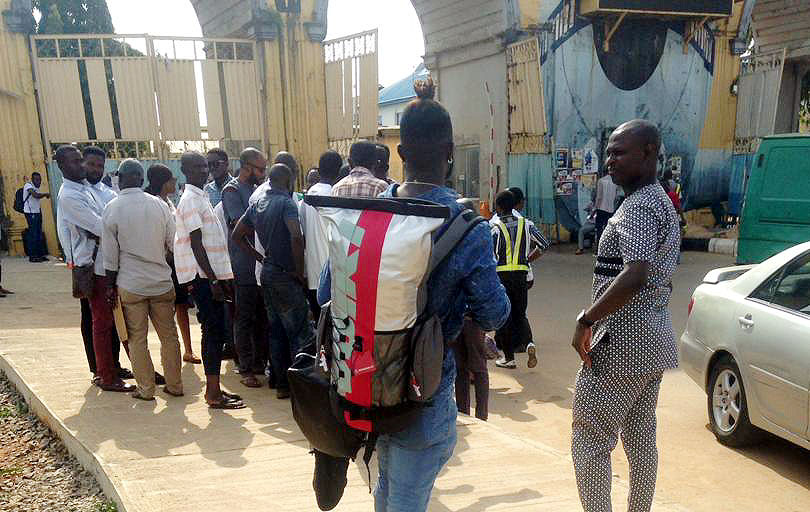
The former MP, who was the chairman of the Committee on IDPs, Refugees & North-East Initiatives during his time in the federal parliament, said Nigeria supports the Global Compact on Migration, which provides a process for readmitting citizens expelled from foreign countries.
Zorro, who’s also a former president of the Nigerian Union of Journalists, appealed to Germans to look into ways of mitigating the difficulties faced by returnees. He called for investment in tourism in Edo State, a major source of irregular migrants, to create jobs for those forcibly returned.
He also called for increased German investments in the Nigerian economy, while noting ongoing efforts to woo Volkswagen back to the country. “Turks are investing in university education and hospitals, among others. Germans can emulate them by investing more actively in Nigeria,” he said.
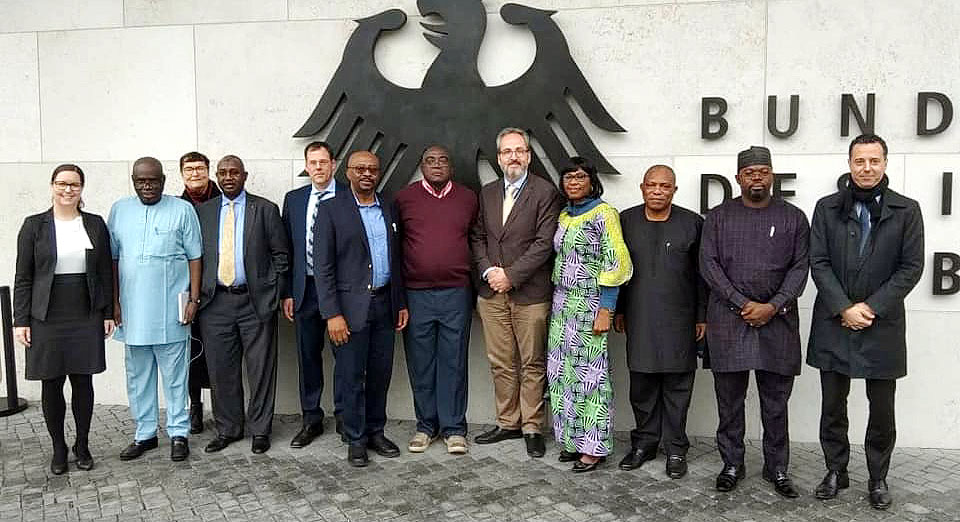
Need for more assistance for returnees
In his submission, Godwin Emeke Morka, Director of Research and Programme Development at Nigeria’s National Agency for Prohibition of Trafficking in Persons (NAPTIP), called for more German assistance for the reintegration of returnees. He also appealed for measures to enable Nigerians benefit from Germany’s new labour migration law by providing more opportunities to learn German language in Nigeria.
READ ALSO Germany opens more doors for legal immigration
Moreover, Mr Morka called for more German investment in the Nigerian economy to create more jobs, while assuring that Nigeria was co-operating with Germany on managing migration by tightening its borders and improving the security of its identity documents.
Morka advised Germans to explore solutions other than repatriation such as training the rejected asylum-seekers to fill labour shortages in the country. However, the official German position is that allowing rejected asylum-seekers such a path to the regularisation of their stay will only encourage more irregular migration to the country.
In his contribution, Dr Christian Klos, Director for Return Policy at the German interior ministry, said his country’s policy was to encourage voluntary compliance and return which is why it’s offering return and reintegration assistance.
It’s a very interesting event during which officials of both countries were able to state their positions clearly, revealing areas needing policy adjustment and reappraisal.
Femi Awoniyi
* Out of the 11,073 Nigerians who applied for asylum in Germany in 2018, only 794 were granted refugee status, with 3,329 cases pending at the end of the year. Nigeria was the 4th most important country of origin of refugees in Germany last year – after Syria, Iraq and Iran.
 THE AFRICAN COURIER. Reporting Africa and its Diaspora! The African Courier is an international magazine published in Germany to report on Africa and the Diaspora African experience. The first issue of the bimonthly magazine appeared on the newsstands on 15 February 1998. The African Courier is a communication forum for European-African political, economic and cultural exchanges, and a voice for Africa in Europe.
THE AFRICAN COURIER. Reporting Africa and its Diaspora! The African Courier is an international magazine published in Germany to report on Africa and the Diaspora African experience. The first issue of the bimonthly magazine appeared on the newsstands on 15 February 1998. The African Courier is a communication forum for European-African political, economic and cultural exchanges, and a voice for Africa in Europe.


























